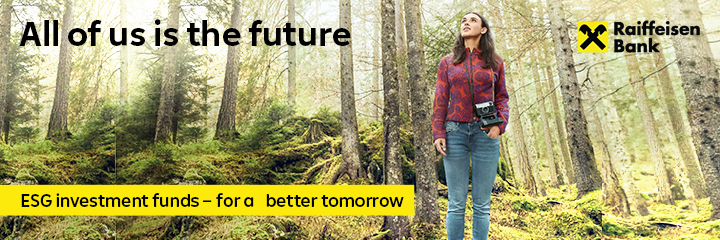ESG Investments - Raiffeisen ENGLISH
Breadcrumb
Asset Publisher
ESG INVESTMENTS

Sustainable investment funds are based on the idea that those companies and countries that use their resources in a sustainable way will probably achieve better economic performance as well than those that do not pay enough attention to all of these.
Besides integrating sustainability risk in the traditional analysing and risk management processes, in the case of sustainable investment funds, the investment strategy is expanded with a sustainable goal or with some environmental or social aspects (ESG aspect).
The essence of this ESG aspect is that the underlying security issuers (companies & countries) go throw a preliminary environmental (E), social (S) and governance (G) analysis. This kind of analysis and selection criteria is called ESG.
Raiffeisen Investment Fund Management (RIF) has integrated sustainability risk for all investment funds it manages. And the following funds have been compiled in such a way that their portfolios only contain securities of issuers (companies, countries) that meet predetermined ESG criteria1. These are investment funds ‘promoting ESG goals.2
Raiffeisen ESG Short Bond Fund of Funds
Raiffeisen ESG Conservative Fund of Funds
Raiffeisen ESG Balanced Fund of Funds
Raiffeisen International Equity Fund
Raiffeisen Megatrend ESG Equity Fund of Funds
Compliance with ESG criteria and compilation of ESG portfolios is managed by Raiffeisen Kapitalanlage-Gesellschaft m.b.H. (Raiffeisen Capital Management, RCM, the wealth management company of Raiffeisen Bank International AG) in Vienna. You can read the ESG principles used by Austrian colleagues on the product site of the ESG Funds: Raiffeisen ESG Short Bond Fund of Funds, Raiffeisen ESG Conservative Fund of Funds, Raiffeisen ESG Balanced fund of funds, Raiffeisen International Equity Fund, Raiffeisen Megatrend ESG Equity Fund of Funds. The most important points of ESG criteria are summarized below:
ESG Funds avoid investing in some specific industries like uranium production, nuclear energy, controversial weapons, coal mining and in bonds issued by countries where death penalty is used or where human rights are continuously and severely violated. Non-ratification of Paris Agreement is also a negative criteria for countries. Besides these ESG Funds do not invest in genetic manipulation and derivative food speculation is forbidden.
The issuers of the securities in the investment universe go throw an ESG analysis and they get a sustainability score. When making investment decisions, portfolio managers take ESG scoring in consideration, because they try to choose assets in the ESG portfolios with attractive financial indicators and a high ESG score as well. So, the companies and countries included in the portfolio contribute to:
- reducing environmental pollution,
- using renewable energy sources,
- reducing CO2 emission,
- using less water and energy,
- recycling, using modern waste management processes,
- eliminating inequalities between genders and religions,
- developing and supporting education and healthcare,
- avoiding the use of child labour,
- avoiding the violation of human rights and labour rights,
- using transparent and corruption-free corporate governance methods.
Sustainability risks and methods are managed and disclosed in accordance with the principles defined in the Regulation 2019/2088 of the European Parliament and Council (SFDR Regulation) by Raiffeisen Investment Fund Management.
Related documents:
- Sustainability policy
- Nuclear energy policy
- Coal industry policy
- Ecological Footprint
- Engagement report
1 indirectly, using fund of funds structure
2 Regulation (EU) 2019/2088 of the European Parliament and of the Council on Sustainability-related Disclosures in the Financial services Sector